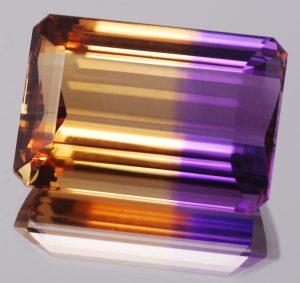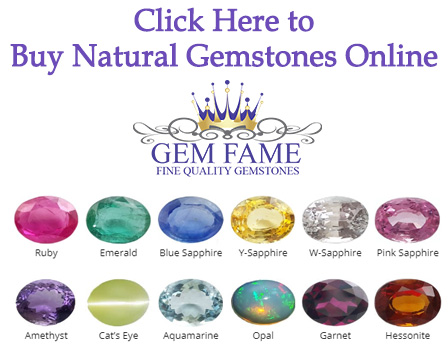Ametrine
Ametrine is the occurrence of Amethyst and Citrine together in one gem. It is the variety that is purple/yellow of, probably one of the most common minerals on Earth. Ametrine is available in a variety of colours, from violet/yellow to purple/orange that is deep. The colour is due to trace elements added towards the silicon dioxide formula that is basic. Natural Citrine gems can sometimes show both violet and yellowish colours in striking zonal patterns corresponding to growth that is rhombohedral. Natural Ametrine is somewhat rare in nature but is often artificially created by warming both synthetic and natural Amethyst. These gems are virtually indistinguishable from natural Ametrine gems.
The main sourced elements of Ametrine are Rio Grande do Sul, Brazil and La Gaiba District, Sandoval Province, Santa Cruz Department, Bolivia.
| Chemical Formula: | SiO2 |
| Silicon Dioxide | |
| Molecular Weight: | 60.08 gm |
| Composition: | Silicon | 46.74 % | Si | 100.00 % | SiO2 |
| Oxygen | 53.26 % | O | |||
| 100.00 % | 100.00 % | = TOTAL OXIDE |
| Crystallography: | Trigonal – Trapezohedral |
| Crystal Habit: | As enantiomorphic prismatic crystals; may be morphologically complex, with over 500 forms noted, to 6 meters and 36 tonnes; Crystalline – Coarse – Occurs as well-formed coarse sized crystals; Crystalline – Fine – Occurs as well-formed fine sized crystals; Druse – Crystal growth in a cavity which results in numerous crystal tipped surfaces. |
| Twinning: | Very common, penetration twins on the Dauphiné law, about [0001], and the Brazil law, with [1120] as contact plane; contact twins on the Japan law, with [1122] as contact plane, may be repeated; and several other laws. |
| Cleavage: | None or [0110] Indistinct |
| Fracture: | Conchoidal |
| Tenacity: | Brittle |
| Moh’s Hardness: | 7.0 |
| Density: | 2.60 – 2.65 (g/cm3) |
| Luminescence: | May be Triboluminescent; varies widely due to traces of impurities |
| Radioactivity: | Not Radioactive |
| Other: | Piezoelectric and Pyroelectric and may be Triboluminescent |
| Color: | Pale Lilac, Violet, Purple |
| Transparency: | Transparent |
| Luster: | Vitreous (Glassy) |
| Refractive Index: | 1.544 – 1.553 Uniaxial ( + ) |
| Birefringence: | 0.0090 |
| Dispersion: | 0.013 |
| Pleochroism: | Weak |


